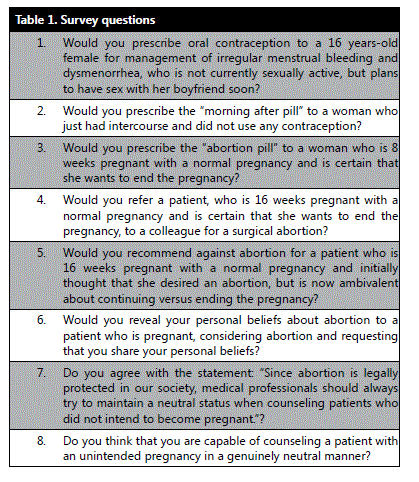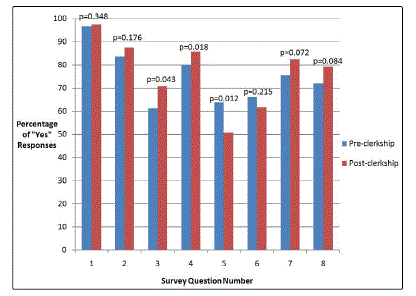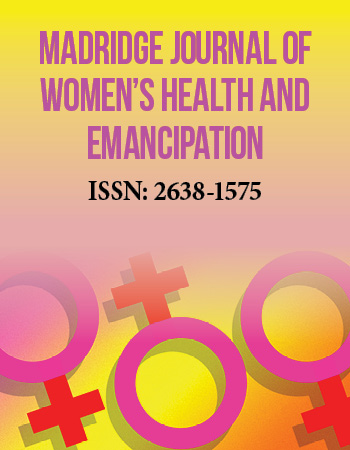Research Article
Effect of Clinical Clerkships on Medical Student Attitudes toward Abortion and Contraception
1Department of Obstetrics and Gynecology, University of Iowa Hospitals and Clinics, Iowa City, USA
2Department of Emergency Medicine, University of Iowa Hospitals and Clinics, Iowa City, USA
*Corresponding author: Abbey J Hardy-Fairbanks, Department of Obstetrics and Gynecology, University of Iowa Hospitals and Clinics, 200 Hawkins Drive, Iowa City, IA 52242, USA, Tel: 319.356.2291, E-mail: abbey-hardy-fairbanks@uiowa.edu
Received: June 20, 2017 Accepted: July 04, 2017 Published: July 11, 2017
Citation: Brock EN, Stockdale CK, House HR, Hardy-Fairbanks AJ. Effect of Clinical Clerkships on Medical Student-Attitudes toward Abortion and Contraception. Madridge J Womens Health Emancipation. 2017; 1(1): 4-6. doi: 10.18689/mjwh-1000102
Copyright: © 2017 The Author(s). This work is licensed under a Creative Commons Attribution 4.0 International License, which permits unrestricted use, distribution, and reproduction in any medium, provided the original work is properly cited.
Abstract
Objective: The aim of this study was to investigate medical students' perceptions and
individual attitudes toward abortion and contraception before and after their clinical
clerkships, as well as to assess overall trends in attitude change toward specific abortion
and contraception topics.
Methods: As part of their required curriculum, second-year medical students at the
University of Iowa complete an anonymous survey that presents eight questions
involving specific contraception and abortion topics.Members of the Class of 2014 were
invited to re-take this survey in their fourth year. Students were also askedspecifically if
they felt that clinical clerkships had changed their perspectives on contraception and
abortion in general.
Results: Of the 173 members of the Class of 2014, 124 chose to participate, for a
response rate of 71.7%. Twenty-six students (21.0%) felt that clinical clerkships had
changed their perspectives on abortion and thirty-five students (28.2%) felt that clinical
clerkships had changed their perspectives on contraception. The percentage of students
who would recommend against abortion for an ambivalent patient decreased from
63.9% to 50.8% (p=0.012). The percentage of students who would refer a patient for a
surgical abortion increased from 76.0% to 85.8% (p=0.018). The percentage of students
who would offer a medical abortion increased from 61.2% to 70.8% (p=0.042). Responses
to the other five questions included in the survey did not differ significantly pre and
post-clerkship.
Conclusions: Clinical clerkships have the ability to affect medical students' attitudes
toward abortion and contraception in general, as well as toward specific abortion topics.
Keywords: Medical student attitudes; Abortion; Contraception; Clinical clerkships.
Background
Prior to medical school, students' perspectives on issues of human sexuality are
predominantly influenced by religious beliefs, political affiliation, family culture and
social exposures. In 1996, the American Medical Association released a council report
stating: "The physician's non-judgmental recognition of sexual orientation and behavior
enhances his or her ability to render optimal patient care in health as well as in illness."[1]
Since then, increasing focus has been placed on the ability for medical school education
to impact medical students' perspectives on issues of human sexuality.
Research has shown that various teaching modalities, including lecture presentations,
small group discussions and clinical clerkships effect medical students' attitudes toward lesbian, gay, bisexual and transgender (LGBT) issues [2-4].
Similar research, aimed at investigating how these teaching
modalities affect medical students' attitudes toward other
human sexuality issues-such as abortion and contraception -
is lacking. Only one published study to date has investigated
how clinical clerkships affect medical students' attitudes
toward abortion. In that study, 38% of medical students who
were exposed to abortion care during their Obstetrics and
Gynecology (OB/GYN) clerkship reported a change in their
attitudes toward abortion in general [5]. However, attitudes
toward specific abortion and contraception topics were not
assessed.
A pilot study done at the University of Iowa in 2013
demonstrated that clinical clerkships may have the ability to
affect medical students' attitudes toward abortion and
contraception in general, as well as toward specific abortion
topics [6]. In this pilot study, 40.0% of students felt that clinical
clerkships had changed their attitudes toward abortion and
47.6% of students felt that clinical clerkships had changed
their attitudes toward contraception. Additionally, the
percentage of students who felt comfortable referring a
patient to a colleague for a surgical abortion increased from
71.3% to 90.5% (p=0.024). This pilot study, however, was
limited by a low response rate of 26.4%.
The aim of this study was to further investigate medical
students' perceptions of individual attitude change toward
abortion and contraception as a result of clinical clerkships, as
well as to assess overall trends in attitude change toward
specific abortion and contraception topics.
Methods
Members of the University of Iowa Carver College of Medicine Class of 2014 completed an anonymous survey as part of their required second-year curriculum, prior to clinical clerkships. The survey included the following eight questions involving specific abortion and contraception topics (Table 1 and Figure 1).

Institutional Review Board approval (IRB #201304742) was obtained to re-administer this survey to the members of the Class of 2014at the end of their fourth-year, following clinical clerkships. In March 2014, at a pre-Match Day meeting, members of the Class of 2014 were invited to re-take this survey and to answer two additional questions regarding whether or not they felt that clinical clerkships had changed their perspectives on abortion, as defined as the termination of an otherwise viable pregnancy, and contraception, as defined as any action taken to avoid conception. Post-clerkships responses were anonymous. Data was maintained using REDCap electronic data capture tools hosted University of Iowa.(7)REDCap (Research Electronic Data Capture) is a secure, web-based application designed to support data capture for research studies. SAS statistical software was then used to compare pre and post-clerkship responses with two-population proportion tests to yield 1-tailed Z-scores.
Results
Of the 173 members of the Class of 2014, 124 chose to
participate in our pilot study, for a response rate of 71.7%.
Twenty-six students (21.0%) reported that clinical clerkships
had changed their perspectives on abortion and thirty-five
students (28.2%) felt that clinical clerkships had changed their
perspectives on contraception.
The percentage of students who would offer a medical
abortion significantly increased from 61.2% to 70.8%
(p=0.043). The percentage of students who would refer a
patient for a surgical abortion significantly increased from
76.0% to 85.8% (p=0.018). The percentage of students who
would recommend against abortion for an ambivalent patient
significantly decreased from 63.9% to 50.8% (p=0.012).
Responses to the other five questions included in the survey
did not differ significantly pre and post-clerkship (Figure 1).

Figure 1: Comparison of attitudes toward abortion and contraception pre- and post-clinical clerkship.
Discussion
This study confirms that a significant percentage of
medical students perceive that their individual attitudes
toward abortion and contraception change as a result of
clinical clerkships. Perhaps more importantly, our study
expanded upon the existing literature by demonstrating that
overall trends in attitudes toward specific abortion topics also
change during the clinical years.
Our study did not ask medical students to report whether
their individual attitudes had changed to be more in favor or
less in favor regarding abortion and contraception.
Additionally, our study did not control for whether overall
trends in attitude changed toward specific abortion and
contraception topics were due to the OB/GYN clinical clerkship
itself versus life or other experiences during the clinical years.
It is also important to note that the medical student experience
on the OB/GYN clinical clerkship at the University of Iowa is
variable, as students can opt in or out of exposure to abortion
care. Exposure to contraception is part of all training for
medical students, but can be variable based on individual
patient scenarios and provider practices. Furthermore, our survey may not have included all of the unique scenarios
involving abortion and contraception that the medical
students were exposed to during their clinical clerkships and
therefore may not have completely evaluated for overall
trends in attitude change.
Many students enter medical school with preconceived
attitudes toward controversial issues of human sexuality, such
as abortion and contraception. Exposing medical students to
patients who desire these interventions during their clinical
clerkships is important in helping them to develop their
respect and tolerance of patient choices. It is also important in
helping them to develop a non-judgmental and evidenced-
based approach when interacting with patients who desire
these interventions. As an example of this importance,
although not statistically significant, the percentage of
medical students in our study who felt capable of neutral
counseling in the setting of an undesired pregnancy increased
from 72.1% to 79.2% (p=0.084) following clinical clerkships.
Conflicts of interest: The author reported the conflict of
interest statement.
References
- Anonymous. Health care needs of gay men and lesbians in the United States. Council on Scientific Affairs, American Medical Association. JAMA. 1996; 1:275 (17):1354-9.
- Thomas JL, Scott LK, Brooks CM. Attitude change in a human sexuality course that de-emphasizes small group activities. Med Educ. 1980; 14(4): 245-58. doi: 10.1111/j.1365-2923.1980.tb02270.x
- Kelly L, Choul CL, Dibble SL, Robertson PA. A critical intervention in lesbian, gay, bisexual and transgender health: Knowledge and attitude outcomes among second-year medical students. Teach Learn Med. 2008; 20(3): 248-53. doi: 10.1080/10401330802199567
- Sanchez NF, Rabatin J, Sanchez JP, Hubbard S, Kalet A. Medical students' ability to care for lesbian, gay, bisexual and transgender patients. Fam Med. 2006; 38(1): 21-7.
- Espey E, Ogburn T, Dorma D. Students attitudes about a clinical experience in abortion care during the OB/GYN clerkship. Acad Med. 2004; 79(1): 96-100.
- Brock EN, Stockdale CK, House HR, Hardy-Fairbanks A. The impact of clinical clerkships on medical students' attitudes toward contraception and abortion: A pilot study. POG in Press.2015; Article 1 [5p.]
- Harris PA, Taylor R, Thielke R, Payne J, Gonzalez N, Conde JG. Research electronic data capture (REDCap) - A metadata-driven methodology and workflow process for providing translational research informatics support, J Biomed Inform. 2009; 42(2): 377-81. doi: 10.1016/j.jbi.2008.08.010


